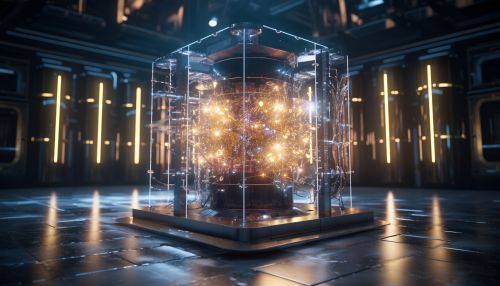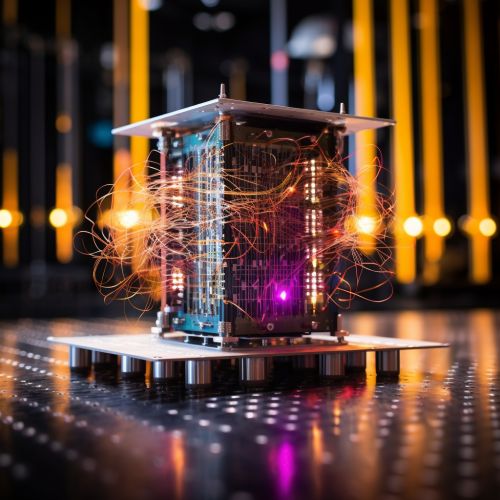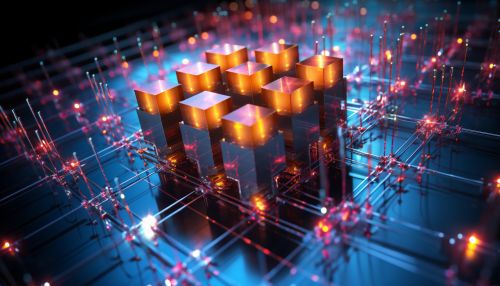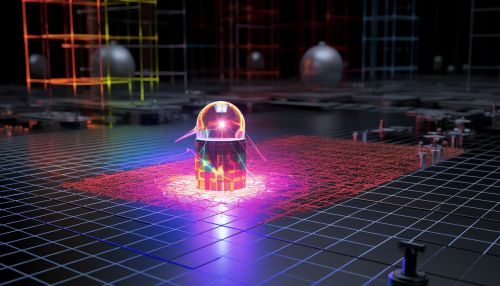Physics of Quantum Electronics in Computing
Introduction
Quantum electronics is a branch of physics that deals with the application of quantum mechanics to the study of the behavior of electrons in matter. It is a field that has seen significant advancements in recent years, particularly in the realm of computing. Quantum computing, a subfield of quantum electronics, utilizes the principles of quantum mechanics to perform computational tasks more efficiently than classical computers. This article delves into the physics of quantum electronics in computing, exploring the principles and phenomena that underpin this cutting-edge field.


Quantum Mechanics and Electronics
Quantum mechanics is a fundamental theory in physics that provides a description of the physical properties of nature at the scale of atoms and subatomic particles. It is the foundation of all quantum physics, including quantum chemistry, quantum field theory, quantum technology, and quantum information science. Quantum electronics, on the other hand, is a term that was originally introduced to denote the electron phenomena in semiconductors in the presence of strong electric fields. Today, it has evolved to encompass a wide range of phenomena in which quantum mechanical effects are significant.
Quantum Computing
Quantum computing is a type of computation that makes direct use of quantum-mechanical phenomena, such as superposition and entanglement, to perform operations on data. Quantum computers are different from binary digital electronic computers based on transistors. Whereas common digital computing requires that the data be encoded into binary digits (bits), each of which is always in one of two definite states (0 or 1), quantum computation uses quantum bits or 'qubits', which can be in superpositions of states.


Principles of Quantum Computing
The principles of quantum computing are inherently tied to the strange and counter-intuitive nature of quantum mechanics. These principles include quantum superposition, quantum entanglement, and quantum tunneling.
Quantum Superposition
Quantum superposition is a fundamental principle of quantum mechanics that holds that any two (or more) quantum states can be added together, or 'superposed', and the result will be another valid quantum state. In the context of quantum computing, this allows qubits to exist in multiple states at once, thereby enabling them to perform multiple calculations simultaneously.
Quantum Entanglement
Quantum entanglement is a quantum mechanical phenomenon in which two or more particles become linked and instantaneously affect each other's state no matter how far apart they are. This property is used in quantum computing to link qubits together in a way that significantly increases the computational power of the quantum computer.
Quantum Tunneling
Quantum tunneling is a quantum mechanical phenomenon where a particle tunnels through a barrier that it could not classically cross. In quantum computing, this principle is used to read the state of a qubit without disturbing the superposition of states.


Quantum Algorithms
Quantum algorithms are a set of procedures that are run on a quantum computer. These algorithms take advantage of the principles of quantum mechanics to solve certain types of problems more efficiently than classical algorithms. Some of the most well-known quantum algorithms include Shor's algorithm for factoring large numbers, and Grover's algorithm for searching unsorted databases.
Quantum Error Correction
Quantum error correction is a set of techniques for correcting errors that occur in quantum computers. Due to the delicate nature of quantum states, quantum computers are highly susceptible to errors caused by factors such as environmental noise and imperfect operations. Quantum error correction codes are designed to protect quantum information from errors without disturbing the quantum state.


Challenges and Future Directions
Despite the significant advancements in quantum computing, there are still many challenges to overcome. These include the difficulty in maintaining quantum coherence, the high error rates, and the lack of efficient quantum algorithms for many practical problems. However, ongoing research and development in this field continue to push the boundaries of what is possible, paving the way for a future where quantum computers could revolutionize fields such as cryptography, optimization, and drug discovery.
See Also
- Quantum Information Science - Quantum Cryptography - Quantum Machine Learning
